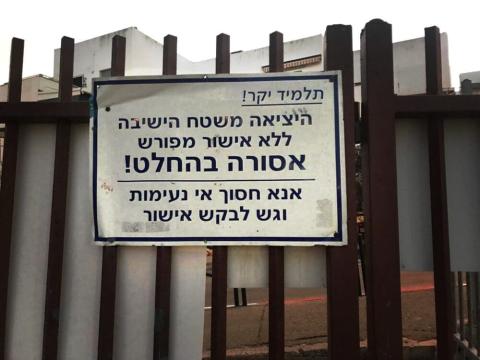A serious incident of violence at a school in Haifa is exacerbating the violence crisis in the education system
A fight between students ended in serious injury and a police investigation
According to reports from the school, the fight broke out between three students during the school day. One of them was injured and evacuated by MDA teams for medical treatment. Students who witnessed the incident described a difficult scene because of the blood that was spilled, and it was difficult to clean up. Another student added: "This is not the first incident. There was a fight last week too."
The provincial Ministry of Education said they are taking the incident very seriously
"Immediately after the incident, an in-depth educational and disciplinary process took place with the student, with the aim of clarifying the seriousness of the act and drawing lessons from it. In addition, it was decided to hold an educational committee with the participation of representatives of the district, the local authority and the school, in order to build a systemic intervention plan that will prevent similar incidents from recurring in the future and strengthen the sense of security and responsibility among the students in the class."
The incident joins a worrying increase in violence in Haifa schools
The incident at the school is not an isolated incident. In recent weeks, there has been a worrying increase in incidents of violence at schools in and around Haifa. Just this week, an indictment was filed against a resident of Kiryat Bialik for assaulting a teacher at the school where his son attends. According to the indictment, the father arrived at the school, forcibly removed his son from the classroom, returned to the scene, approached the teacher and spat at her.
The incident in Kiryat Bialik highlights the importance of maintaining school entry procedures. According to a circular from the Director General, parents are only allowed to enter school grounds if they have been invited by the administration or teaching staff, and only when accompanied by a staff member. The purpose of the procedures is to prevent incidents of violence by unauthorized visitors. However, in recent years, there have been many cases in Haifa in which parents, siblings, and even grandparents entered schools without permission, and sometimes even attacked students or teachers.
The murder of a student in Kafr Qara illustrates the severity of the situation
Two weeks ago, Mohammed Marazka, a 17-year-old student, was murdered at a school in Kafr Qara by a relative of his, who also attended the school. According to reports, the fight broke out after the killer said to Marazka, "Why are you looking at me?" The school principal said that the student who stabbed him had joined the school only a month earlier, after begging to be accepted. The incident caused a deep shock in the education system and the general public.
Education Minister Yoav Kish expressed his shock at the Kafr Qara incident. Data from recent years indicate a sharp increase in the number of murders in the Arab sector, specifically during Ben Gvir's term in office. The only thing that stood out in his activities was the distribution of weapons to civilians, which created a sense of helplessness and a lack of confidence in the police's ability to deal with the increasing crime.
Many believe that the police are investing a lot of resources in creating a "political police," focused on fighting center-left protesters, while the meaningful, day-to-day work with citizens is neglected. In the run-up to the upcoming elections, it seems that most of the activity is focused on maintaining political support, rather than truly addressing the problems of violence and crime.
Violence in Israeli society
The events in the schools are just an expression of a broader phenomenon of violence in Israeli society. Anyone who watches Knesset debates, plenary sessions, and committees sees ministers and MKs shamelessly cursing and humiliating each other. Parents of the kidnapped who come to the Knesset are met with humiliating treatment and sometimes even physical violence. During demonstrations, public discourse quickly turns into severe physical violence, sometimes disproportionate to the disruption of public order.
The connection between state leadership and public behavior
As always, the fish rots from the head. When Prime Minister Benjamin Netanyahu and his government members do not address the public in an attempt to calm the situation, and continue with violent and divisive discourse, the violence only increases. It appears in the Knesset, on the roads, in homes, at demonstrations, and of course in schools. If parents do not educate their children to behave respectfully even when angry, and if they themselves do not set an example of calm behavior towards teaching staff, the situation is expected to worsen.
Recent events highlight the need for a broad systemic response, both from the education system and from local and national authorities. There is a need to increase enforcement, toughen penalties, train teaching staff to deal with extreme situations, and strengthen the connection between schools and the community. Only in this way can a safe, respectful, and protected learning environment be ensured for every student.
Michal Grover

